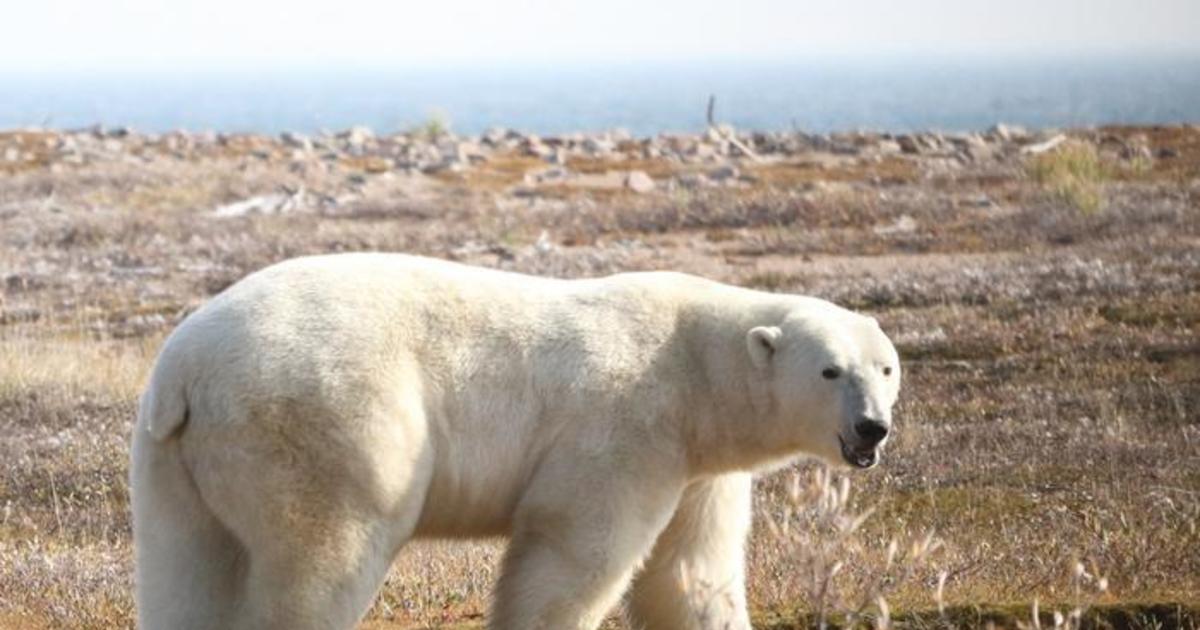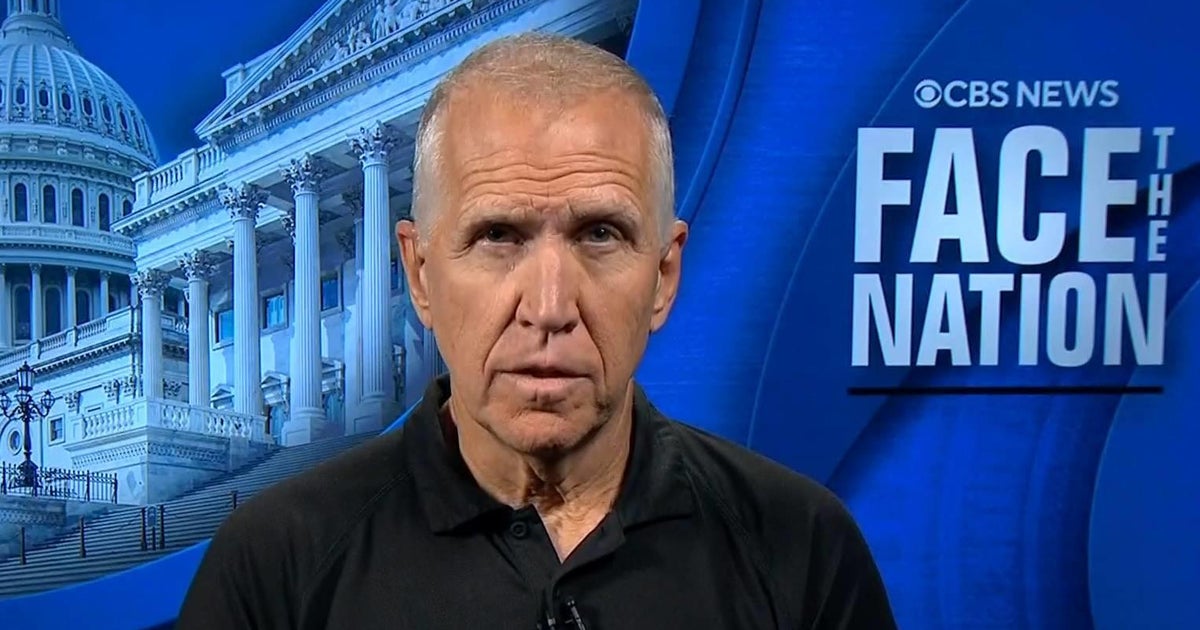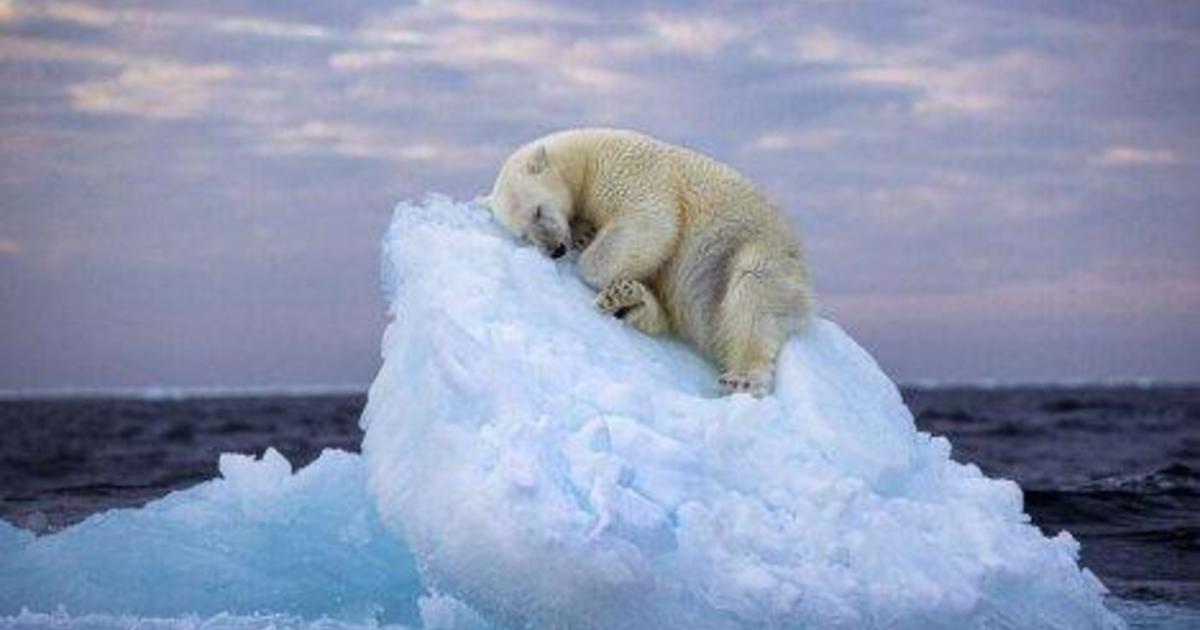CBS News
Polar bears stuck on land longer as ice melts, face greater risk of starvation, researchers say

Polar bears, unable to thrive on land in Canada’s Hudson Bay, are facing greater risk of starvation as Arctic ice melts and they endure longer ice-free seasons, researchers said.
In a study published Tuesday in the journal Nature Communications, researchers said they’d hoped polar bears might adapt to longer ice-free seasons by behaving like their grizzly bear relatives. The 20 polar bears tracked in the study tried a variety of strategies, including shifting their diet and resting more, but all but one bear lost weight.
“Neither strategy will allow polar bears to exist on land beyond a certain amount of time. Even those bears that were foraging lost body weight at the same rate as those that laid down,” said Charles Robbins, director of the Washington State University Bear Center and co-author of the study. “Polar bears are not grizzly bears wearing white coats. They’re very, very different.”
Most types of bears are “opportunistic omnivores,” according to the study, but polar bears feed almost exclusively on ice-dependent seals. They’ll also feed on whale carcasses, when they’re available, according to the National Park Service.
David McGeachy
“Further increases in the time polar bears are forced onto land where they are unable to hunt blubber-rich, energy-dense seals is likely to negatively impact their body condition, survival, and reproductive success,” researchers wrote.
The bears in the study, which researchers tracked for about three weeks using collars with video cameras and GPS, ate bird and caribou carcasses as well as berries, kelp and grasses. But foraging for the food used up valuable energy.
“The terrestrial foods did give them some energetic benefit, but ultimately, the bears had to spend more energy to access those resources,” said the study’s lead author, Anthony Pagano, who is a research wildlife biologist with the U.S. Geological Survey Polar Bear Research Program.
Three polar bears went for long swims, with one even traveling about 110 miles. Two of the swimmers found carcasses in the water — a beluga and a seal — but neither bear could feed on their finds while swimming. They were also unable to bring them back to land.
“As polar bears are forced on land earlier, it cuts into the period that they normally acquire the majority of the energy they need to survive,” Pagano said. “With increased land use, the expectation is that we’ll likely see increases in starvation, particularly with adolescents and females with cubs.”
The ice-free period increased by three weeks between 1970 and 2015, according to the study, keeping polar bears on land longer.
“Climate warming is increasing the duration that some areas of the Arctic are ice free, which in turn forces polar bears in these regions to move to land,” the researchers wrote.
Polar bears, the largest living bear species, are considered threatened by the U.S. Fish and Wildlife Service. A 2020 study warned that climate change was on track to wipe out polar bears by the end of the century.
Li Cohen contributed to this report.
CBS News
10/6: Face the Nation – CBS News

Watch CBS News
Be the first to know
Get browser notifications for breaking news, live events, and exclusive reporting.
CBS News
Sen. Thom Tillis says “the scope” of Helene damage in North Carolina “is more like Katrina”

As recovery missions and repairs continue in North Carolina more than a week after Hurricane Helene carved a path of devastation through the western part of the state, the state’s Republican Sen. Thom Tillis called for more resources to bolster the relief effort and likened the damage to Hurricane Katrina’s mark on Louisiana in 2005.
“This is unlike anything that we’ve seen in this state,” Tillis told CBS News’ Margaret Brennan on “Face the Nation with Margaret Brennan” on Sunday morning. “We need increased attention. We need to continue to increase the surge of federal resources.”
Hurricane Helene ripped through the Southeast U.S. after making landfall in Florida on Sept. 26 as a powerful Category 4 storm. Helene brought heavy rain and catastrophic flooding to communities across multiple states, including Georgia, South Carolina, Tennessee and Virginia, with North Carolina bearing the brunt of the destruction. Officials previously said hundreds of roads in western North Carolina were washed out and inaccessible after the storm, hampering rescue operations, and several highways were blocked by mudslides.
Tillis said Sunday that most roads in the region likely remained closed due to flooding and debris. Water, electricity and other essential services still have not been fully restored.
“The scope of this storm is more like Katrina,” he said. “It may look like a flood to the outside observer, but again, this is a landmass roughly the size of the state of Massachusetts, with damage distributed throughout. We have to get maximum resources on the ground immediately to finish rescue operations.”
Hurricane Katrina left more than 1,000 people dead after it slammed into Louisiana’s Gulf Coast in August 2005, flooding neighborhoods and destroying infrastructure in and around New Orleans as well as in parts of the surrounding region. It was the deadliest hurricane to hit the mainland U.S. in the last 50 years, and the costliest storm on record.
The death toll from Hurricane Helene is at least 229, CBS News has confirmed, with at least 116 of those deaths reported in North Carolina alone. Officials have said they expect the death toll to continue to rise as recovery efforts were ongoing, and a spokesperson for the police department in Asheville told CBS News Friday their officers were “actively working 75 cases of missing persons.”
On Saturday, the U.S. Department of Transportation released $100 million in emergency funds for North Carolina to rebuild the roads and bridges damaged by the hurricane.
“We are providing this initial round of funding so there’s no delay getting roads repaired and reopened, and re-establishing critical routes,” U.S. Transportation Secretary Pete Buttigieg said in a statement. “The Biden-Harris administration will be with North Carolina every step of the way, and today’s emergency funding to help get transportation networks back up and running safely will be followed by additional federal resources.”
President Biden previously announced that the federal government would cover “100%” of costs for debris removal and emergency protective measures in North Carolina for six months.
With North Carolina leaders working with a number of relief agencies to deal with the aftermath of the storm, Tillis urged federal officials to ramp up the resources being funneled into the state’s hardest-hit areas. The senator also addressed a surge in conspiracy theories and misinformation about the Biden Administration’s disaster response, which have been fueled by Republican political figures like former President Donald Trump.
Trump falsely claimed that Mr. Biden and Vice President Kamala Harris, his Democratic opponent in the November presidential election, were diverting funds from Federal Emergency Management Agency that would support the relief effort in North Carolina toward initiatives for immigrants. He also said baselessly that the administration and North Carolina Gov. Roy Cooper, a Democrat, were withholding funds because many communities that were hit hardest are predominantly Republican. Elon Musk has shared false claims about FEMA, too.
“Many of these observations are not even from people on the ground,” Tillis said of those claims. “I believe that we have to stay focused on rescue operations, recovery operations, clearing operations, and we don’t need any of these distractions on the ground. It’s at the expense of the hard-working first responders and people that are just trying to recover their lives.”
CBS News
Face the Nation: Tillis, Tyab, Russel

Watch CBS News
Be the first to know
Get browser notifications for breaking news, live events, and exclusive reporting.







